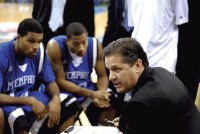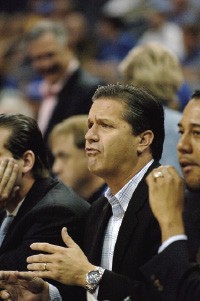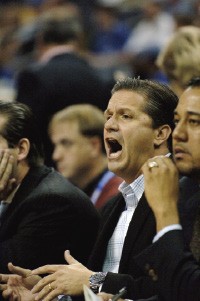Here’s a dose of perspective on John Calipari as he opens his eighth season atop the University of Memphis basketball program. When he wins his 13th game, Calipari will have won more games at Memphis (194) than he did at the University of Massachusetts, where he became a national figure. When he wins his 19th game, he’ll join Larry Finch as the only other coach in Tiger history to win 200 games. As Calipari’s club starts a campaign that many fans and prognosticators say will end at the Final Four in San Antonio, the Flyer sat down with the coach to fill in a few blanks.
Flyer: This is your eighth season in Memphis. There were fans who said you’d be here no more than three or four years — that this was a stepping-stone to a better job.
Calipari: I wanted my daughters to graduate [from high school here], both of them. I’ve also said, the entire time, that if the school stays committed to winning a national championship, I’ll stay. I have not changed what I’ve said since day one. The minute that waivers, I’m gone, because I’m not the kind of coach you want for a program winning 18 or 19 games. People will go crazy. I’d go crazy. People look at the way I do business, they’re waiting in the weeds, and they take shots. They go crazy.
My second daughter graduates from Briarcrest this year. The university waivered on a commitment — to my staff, not to me — when I almost went to N.C. State [in 2006]. They had other commitments. We came together, though, and it worked out.
What about Memphis — basketball-related or otherwise — has surprised you?
It’s not the basketball town everybody says it is. If it were, all our games would be packed, not just all the tickets sold. It’s a sports town, but it’s not the basketball town everyone portrays it to be.
I hope that the way we’ve elevated the program here has elevated high school programs in the area. Kids here are now looking at winning national championships in college, so the level of play is more well-rounded, and their idea is bigger than just playing for Memphis. They want to compete with any school in the country. We’re on national television more than those other programs are.
But I can’t recruit a player who won’t help me win a national championship. I always said that half of my team would be players from Memphis, and the other half would come from elsewhere. That hasn’t changed.
Do you hear gripes about not suiting up enough Memphis kids?
Sometimes. It bothers me when I see someone make a decision, then there’s an outcry from the public and they waiver. Either what you thought was not thought out enough, or your convictions aren’t what they should be. But if you make a decision, and it’s well thought out and for the right reasons — even if there’s a public outcry — you gotta stick to your guns, or you shouldn’t have made the decision in the first place.
I’m making decisions that affect young people. [When it comes to discipline], I’ve always asked, if it was your son, what would you do? How would you want me to deal with it? Throw him under the bus? Or would you like me to be very firm, fair, show some compassion, and love him like you love him? If he changes, give him another chance. Now, if he doesn’t change, you’re not doing us any favors.
Looking at the season ahead, have you ever gone through training camp with such an abundance of talent?
I’ve had teams like this. But what we’ve done here is, we’ve held them accountable, on and off the court. We had that curfew. They acted like they were 12 years old, so I treated them like they were 12. With abuse comes restrictions.
I was waiting for someone to break curfew. Now, I’m saying if you’re of age, go out but don’t be out after midnight. My job isn’t to police them to the point they can’t make a decision on their own.
How do you incorporate all the Final Four talk — even talk of a number-one ranking — in your daily approach?
First of all, we tell them to think in the moment. If you start thinking about March now, there’s too much anxiety, too many things can happen. What if we have five injuries? Let’s live in this moment, get better today. We’re trying to get individual players better — and they are — and we’re trying to get our team better. And let’s all get closer, have more respect and affection for each other. I want all their emotion and passion to be within, not shown to the crowd.
As the coach, I have to not get too excited — because I easily could, like everyone else. They’re really good. I have to be methodical. I keep looking at areas where we need to get better.
Their feel for defense is not where it should be. All it takes is for one guy to break down on defense. So it has to be five guys together, always, and we’re not close to that yet. Offensively, the pace of the game isn’t where it needs to be. The execution, the screening, the cutting.
But I won’t do tomorrow’s work today. It has to be methodical.
 Larry Kuzniewski
Larry Kuzniewski
There’s considerable irony in a two-time Elite Eight team returning virtually every player, but a freshman is getting the most national attention. Is Derrick Rose that good?
We were 33-4 two years ago, and the team that came back lost three starters and 50 percent of its scoring. We came back and had to have players move from support roles to starring roles. We developed that, along with having a freshman point guard, and we went 33-4 again.
Now, we lost a little of our grit and toughness in Jeremy Hunt. But we’re bringing in three young players who add to our team. This year it’s two freshmen [Rose and Jeff Robinson] and a big man who had to sit out last year [transfer Shawn Taggart]. So how do you incorporate the new players?
Much of it is the kind of kid you bring in. Both [Willie Kemp and Rose] are great as teammates. Both are conscientious and responsible. When I ask for five guys up, Derrick will always defer to Willie. And most of the time Willie will say, no, you go. Willie’s comfortable in his own skin. He knows he’s going to play the same amount of minutes, but he’s going to be so much better. He’s been the biggest surprise for anyone who walks into our gym.
I’ve compared Derrick to Marvin Williams, the kid who went to North Carolina a few years ago [as a freshman star] and became their sixth man. [Derrick] thought that would be great. When someone else on the team does something fabulous, Derrick is ecstatic, and so is Willie.
What kind of player is Rose?
First of all, he’s a great teammate. The guys love him. He’s physicaly and athletically off the charts. Skillwise, he’s one of the best layup shooters I’ve seen in all my time in basketball. In this offense, that’s paramount: making tough layups with big people flying at you. His other skills are improving. He gets really frustrated when he doesn’t know something. He’s very quiet, very reserved. His family hasn’t let anyone into his circle, except his teammates or his teachers from high school.
I said to his mom, “Your son is the nicest star player I’ve ever seen. What did you do?”
She said, “I told him you’re no different from anyone else, and treat people like you want to be treated.”
I talked to Derrick Rose twice by phone [in recruiting him]. That’s all. His mom told me, “My son doesn’t speak. When he came back from your campus, he talked for an hour and wouldn’t stop.”
It came down to who’s going to prepare him best? Who’s gonna help prepare him to be an NBA player and, truthfully, the quickest?
What does Joey Dorsey need to do this season to finish his career the right way?
Act right. Mature. Grow up. He’s two semesters and summer school away from graduating, which is another great story.
 Larry Kuzniewski
Larry Kuzniewski
I tell these kids, when you have children, you want them to grow up and not have to depend on anybody. You don’t want them looking at you when you tell them to get their education and saying, “Well, you don’t have yours.” But if you have your degree, you can tell them where you came from and how you did it.
A lot of these kids are first-generation college-educated, like I was. My grandparents came through Ellis Island. My parents are high-school educated. So I have some compassion for how hard it is for those children to get to the point where they’re thinking about education. It’s easy if your parents are doctors or lawyers.
Our mission is to get people the opportunity to be educated. A few of my players may be a doctor or lawyer, not many. But my hope is that their children all have the ability to be lawyers or doctors or whatever they choose. That’s my hope for a guy like Joey, for Antonio Burks, Andre Allen, Jeremy Hunt.
When you stir your mind, you’re going to be a better basketball player. If you’re lazy and you don’t want to read to stir your mind, how are you going to play the way we do?
Chris Douglas-Roberts is probably the least flashy Tiger star in 20 years. What separates him in your eyes?
When I recruit, I don’t care about polls, stats, or numbers. We flew to Augusta, Georgia, to watch a player from Detroit (he’s now at an SEC school, good player). But as I watched the game, I saw Chris. I liked him better. He played herky-jerky, really didn’t guard anybody. But he showed signs of being unbelievable. His [Amateur Athletic Union] coach said, “You’re picking the right one.”
I just needed to get him to play hard and compete. Obviously, we picked the right kid. Same thing happened with Robert Dozier. At the time I first saw him, he was being recruited by Georgia State. That’s it. He didn’t start as a junior in high school.
Is anything short of a Final Four appearance going to be a disappointment for this team?
I can’t say, because I don’t know what’s going to happen throughout the year.
Here’s an example: We have an injury or two, and we go on the road to Marshall, or Rice, and we get beat — just one game. And there’s a reason behind it. But we’re not going to be a number-one seed now. One game. Now we’re going to be a four or five seed. The most important thing for advancing in the NCAA tournament is getting a high seed. If you get a seventh seed, you’re lucky to win one game.
It’s like golfing. You win or lose on the first tee. How many strokes did you give that guy? What did you give him? You lost before you teed off!
Where are we seeded and why? Now, if we’re a one-seed, it’ll be a disappointment if we don’t get to the Final Four. I say that, and then we end up playing UCLA in California in front of 17,000 fans. Then they’ll say, “Well, Cal, that was a tough one.”
But the last three years, are we up at bat, playing for a Final Four? Yeah. And that’s what we want.
What do you enjoy most about your job today?
When you see that you’re creating hope, not only for these kids but for their families, and when you see they’re responding and they trust what you’re saying to them, it’s heavy, because it’s on you. To see a kid who, a year after I meet him, he looks you in the eye and he’s got a smile on his face. The respect has turned into some affection. To create that hope and see it on the basketball court year after year, that’s what I enjoy most about this. The games are a chess match to me, but I enjoy practices most.
 Larry Kuzniewski
Larry Kuzniewski
Tell us about your relationship with Chinese coaches.
This is a significant moment in my basketball life. Where it’s going to go and what we’re trying to do with it, I don’t think anyone in college basketball has seen. When you’re a top-five program, and you’re not Duke, North Carolina, Kentucky, Kansas, UCLA … when we’re ranked higher than those guys for two straight years, how do we stay there? And what has separated us?
First of all, we’re getting good players, and those players are getting better. But it comes back to the offense. If we’re getting these players because of our offense, what are you going to do if you’re another coach? You’re gonna copy the offense. And there are schools in [Bowl Championship Series] conferences who are going to copy us, because [our offense] recruits. It’s where the game is going.
We’re left with a non-BCS program, a good school — but not an elite school — in a good city, but not an elite city. What do we do? Well, I read an article in The New York Times about basketball in China. That was it … we’ve got to do this. But how do I do this? It’s a communist government. Who do I call?
I spoke with [Dallas Mavericks assistant coach] Del Harris. He told me the Chinese national team was going to be in Dallas in five days. I got on the next plane, went down there, met all the right people, and we put it together.
Can you envision a Chinese student-athlete playing for you here at Memphis?
Yes. I don’t know when, but that would be a dream. But first, we’d like to have a sister-city in China, so the communities are connected. We’d like to get a large contingent of Chinese undergraduate students. This would build an Asian base and draw Asian-Americans to this university. The educational capital from that group would take this university to another level.
Now, if we had a Chinese player, our team would be huge in L.A., San Francisco, Chicago, New York. And then there’s TV. If we’re on national TV here, there may be 1.5 million people watching, and we’re ecstatic. Over there, if we’re on TV: 400 million. We can’t fathom that.
This is your 19th year as a head basketball coach. How does the dynamic change between coaching as a 29-year-old and now as a 48-year-old?
It’s less about you and more about them the older you get. When you’re trying to establish yourself, it’ll come above the team. But as you get older, there’s only one thing that matters: a national championship. It’s about us.
 Larry Kuzniewski
Larry Kuzniewski  Larry Kuzniewski
Larry Kuzniewski  Larry Kuzniewski
Larry Kuzniewski